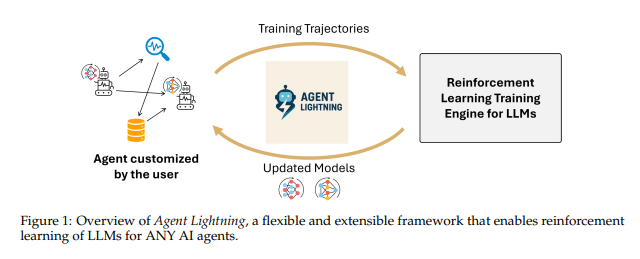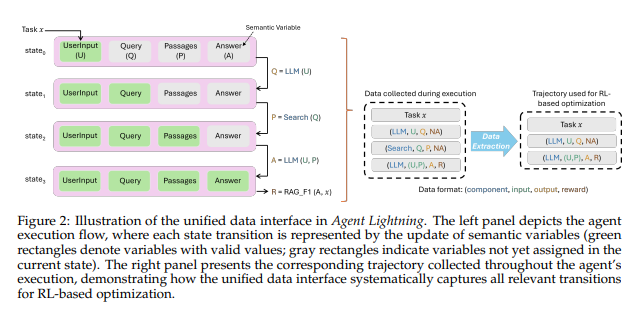Microsoft Research has launched a new reinforcement learning training framework called Agent Lightning, aimed at addressing the challenges of generality and flexibility in current AI agent systems. The framework uses an innovative decoupling design to provide unified reinforcement learning training for AI agents with different architectures.
Although current large language models perform well in tasks such as code writing and content creation, they still have limitations when facing complex multi-turn dialogues, specialized data processing, or unfamiliar tool usage. How to enable these models to continuously learn and improve in real environments has become an important topic in the field of AI research.
Traditional supervised learning methods require a large amount of labeled data, which is costly and time-consuming for complex interactive tasks. Reinforcement learning, as an alternative, allows AI systems to learn through trial and error using reward and penalty mechanisms, making it more suitable for optimizing large models based on real-world feedback.

Paper link: https://arxiv.org/pdf/2508.03680
However, existing reinforcement learning frameworks are primarily designed for single tasks, making them difficult to adapt to the characteristics of AI agents needing to engage in multi-turn dialogues, call external tools, or execute complex task flows. Differences in the architecture of different AI agents also make generalized training challenging.
The core innovation of Agent Lightning lies in its decoupling design approach, which completely separates the execution process of AI agents from the reinforcement learning training process. The framework abstracts the execution process of AI agents into a Markov Decision Process (MDP), describing agent behavior through cycles of states, actions, and rewards.
In this design, the state represents the running state of the AI agent at a specific moment, the action corresponds to the text output of the large language model, and the reward is a score for the effect of the action. Through this abstraction, regardless of whether the AI agent is built using any framework such as LangChain, OpenAI Agents SDK, or AutoGen, its execution process can be converted into a unified data interface format.

To optimize the training effectiveness, Agent Lightning has developed a hierarchical reinforcement learning algorithm called LightningRL. This algorithm can reasonably allocate the overall task reward to each action step in the trajectory, enabling the large model to clearly understand the effect of each operation and achieve more efficient learning.
In terms of system architecture, Agent Lightning adopts a "training-agent separation" design, consisting of two core components: the Agent Lightning Server and the Agent Lightning Client. The server is responsible for managing the reinforcement learning training process and optimizing model parameters, while the client runs the agent, collects data, and communicates with the server. This architecture design achieves complete decoupling between the training process and the agent's operation.

In practical testing, Agent Lightning has shown good performance in multiple scenarios. In the text-to-SQL task, a multi-agent system built using LangChain achieved continuous and stable performance improvement. In the RAG (Retrieval-Augmented Generation) task, an agent built using the OpenAI Agents SDK showed continuous improvement in complex open-ended questions. In the math question-answering task, a math agent built using AutoGen learned to effectively call a calculator tool for precise calculations.
The release of Agent Lightning provides a new technical path for the field of AI agent training. Its general-purpose design allows any AI agent with different architectures to be trained without modifying the code. The flexible architecture supports various application scenarios, including multi-agent collaboration, dynamic workflows, and complex tool calls. The distributed design also provides scalability support for large-scale training.
From a technological development perspective, Agent Lightning represents an important advancement in the standardization and modularization of AI agent training technology. Through its decoupling design concept, this framework is expected to promote the further improvement of the AI agent training ecosystem and lay the foundation for building more intelligent and adaptive AI systems.









